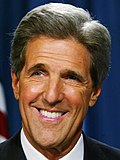62 Democratic National Convention delegates (49 pledged, 13 unpledged) The number of pledged delegates received is determined by the popular vote | |||||||||||||||||||||||||
|---|---|---|---|---|---|---|---|---|---|---|---|---|---|---|---|---|---|---|---|---|---|---|---|---|---|
| |||||||||||||||||||||||||
John Kerry | |||||||||||||||||||||||||
The 2004 Connecticut Democratic presidential primary was held on March 2 in the U.S. state of Connecticut as one of the Democratic Party's statewide nomination contests ahead of the 2004 presidential election.





